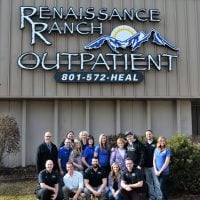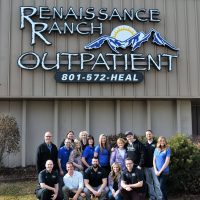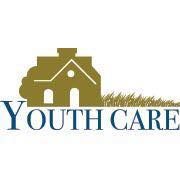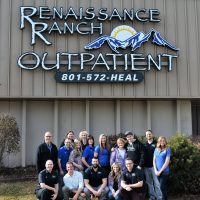Serenity Recovery and Wellness
Drug Rehab Center in Herriman, Utah
Serenity Recovery and Wellness is a rehabilitation center in Utah that offers evidence-based practices, compassionate care, and various therapies to help individuals with addiction, mental health issues, and more, while accepting private health insurance.
About Serenity Recovery and Wellness in Utah
Serenity Recovery and Wellness, located in Herriman, Utah, is a drug treatment center that offers support and assistance to individuals seeking recovery from alcoholism, dual diagnosis, eating disorders, opioid addiction, substance abuse, and drug addiction. They provide a variety of levels of care, including detox, drug rehab, dual-diagnosis treatment, intensive outpatient programs, intervention services, sober-living/half-way houses, residential treatment, and inpatient care. Serenity Recovery and Wellness aims to provide comprehensive and personalized treatment plans to help individuals on their journey towards sobriety and improved mental health.
With a focus on holistic healing and individualized care, Serenity Recovery and Wellness offers a range of services and treatment methods for addiction and substance abuse. Their approach includes evidence-based therapies, such as cognitive-behavioral therapy (CBT) and dialectical behavior therapy (DBT), to address the underlying causes of addiction and promote lasting recovery. Additionally, they provide various modalities like group therapy, individual counseling, family therapy, and experiential therapies to address the physical, emotional, and spiritual aspects of healing. Serenity Recovery and Wellness strives to create a supportive and nurturing environment where individuals can develop coping skills, rebuild relationships, and establish a solid foundation for long-term sobriety.
Genders
Ages
Modality
Additional
Conditions and Issues Treated
Rehabilitation, Medication, and Therapy – a combination of all three is most effective.
The most successful treatments for drug dependence or abuse have been those that include education and counseling and medication such as methadone or buprenorphine. The right drug abuse treatments need counseling, psychotherapy, and detoxification or medications to help with withdrawal symptoms.
Substance abuse can take many different forms, including the overuse or misuse of prescription drugs, unprescribed drugs, alcohol addiction, and drug addiction.
A combination of treatments is often needed to treat drug abuse issues effectively. In the case of drug abuse, there is no easy answer or one-size-fits-all cure.
While some drug addictions can be treated with counseling and support groups, many drug abusers also need medication to help them overcome their addiction. In other cases, drug abuse can lead to a medical problem and require medical treatment.
Treatment for drug addiction typically combines counseling and psychotherapy with medication and behavioral therapies. In some rare cases, hospitalization may also be required. All different treatments combined are the best way to help someone addicted to drugs, alcohol, or other substances.
Treatment for opioid addiction is best made with the help of medical professionals who are experienced in dealing with these types of drugs. This treatment can involve medications, exercise, behavioral therapy, and counseling sessions. It is important to note that the effectiveness of treatments for opioid addiction vary, so it is vital to research which treatment options are suitable for each individual.
Many people who struggle with opioid addiction need to attend specific programs like methadone , Suboxone or Vivitrol clinics.
These types of programs will provide the patient with legal, prescription medications that can help them overcome their cravings for illegal opioids like heroin or fentanyl . If the patient has a chronic condition like Hepatitis C, they must undergo treatment before they can begin taking these medications.
Individuals who are addicted to drugs and/or alcohol often have one or more co-occurring mental health disorders. Addressing both the addiction and the mental health problems at facilities like Serenity Recovery and Wellness can be very beneficial for these individuals.
Common mental health conditions that often co-occur with addiction include:
- Anxiety Disorders – People with drug and alcohol problems often suffer from anxiety disorders such as panic disorder, obsessive-compulsive disorder, social anxiety disorder, and generalized anxiety disorder.
- Depression – One of the most common mental illnesses co-occurring with addiction is major depressive disorder.
- Attention-deficit hyperactivity disorder (ADHD) – Many people with drug and alcohol problems also suffer from ADHD.
- Bipolar Disorder – People with bipolar disorder are more likely to suffer from drug and alcohol problems than the general population, and vice versa.
Levels of Care Offered
This center offers a variety of custom treatment tailored to individual recovery. Currently available are Detox, Drug Rehab, Dual-Diagnosis, Inpatient, Intensive Outpatient, Intervention, Residential, Sober-Living / Half-Way, with additional therapies available as listed below.
Detox is the stage of recovery where the drugs or alcohol are entirely removed from your body. There are two different ways to detox, with medications and without. For many drugs and alcohol, the acute phase of detox can be completed in a number of days.
Inpatient recovery offers individual therapy, groups, and family therapy. The length of inpatient addiction treatment depends on the addict and their addiction. Inpatient rehab is a costly drug treatment, costing anywhere from $30k- to $60k. However, insurance often offers help in covering these costs.
An intensive outpatient treatment program, or IOP, is set up for those struggling with an addiction to begin the recovery process. However, the patient will not live at the facility during treatment.
IOP involves patients coming in and out of a medical office building regularly to receive therapy and other services while continuing their life outside of these visits.
IOP is a step up from drug detoxification or alcohol detox. However, it’s still considered a phase of recovery rather than the ultimate goal. There are many rehabs and treatment facilities available to patients in need of IOP.
Sober living homes are transitional houses for recovering addicts who need more structure than they would receive in an aftercare program. Specific rules and regulations are enforced in these homes, which are beneficial for people who need a greater degree of structure than other types of treatment.
Sober living home options include:
- Live-in managers – might be beneficial to people who do not have a support system in place at home, or who experience high levels of stress between work and home life.
- House managers – House managers are beneficial for people who do not have a strong social network to rely on, or who are concerned about relapse in their daily lives.
- House parents – House parents are beneficial to people who reside in areas without a strong aftercare program for support.
Residential treatment programs are those that offer housing and meals in addition to substance abuse treatment. Rehab facilities that offer residential treatment allow patients to focus solely on recovery, in an environment totally separate from their lives. Some rehab centers specialize in short-term residential treatment (a few days to a week or two), while others solely provide treatment on a long-term basis (several weeks to months). Some offer both, and tailor treatment to the patient’s individual requirements.
Intervention services can be beneficial for people who have not been able to overcome drug and alcohol addiction on their own. It is recommended for individuals whose addiction has led to dangerous or life-threatening circumstances.
Intervention services are beneficial for:
- People who have relapsed after completing other forms of addiction treatment.
- People with drug addictions that have led to dangerous health conditions, such as HIV.
- People who are at risk of losing their family, home, or job due to addiction.
- People who are having difficulty overcoming drug and alcohol addiction on their own.
- An intervention can be conducted by professionals, or by loved ones of an addict. If the person being intervened on agrees to enter addiction treatment after the intervention, the next step would be to choose a treatment program.
If they do not agree to enter addiction treatment after the intervention, loved ones may choose to go back to the drawing board and try another form of treatment. They may also choose to not receive any further treatment, but there are usually other factors in play that may make it difficult for people to stop using drugs or alcohol.
Therapies & Programs
Family therapy can help you and your family deal with old issues that may trigger substance abuse. The idea behind family therapy for drug addiction is that you are never fully healed from substance abuse until you’ve healed your relationship with your family, too. To get sober, you need to find a different way to cope with the pain in your life.
Trauma therapy is a clinical process that helps individuals deal with mental stress often caused by traumatic events. The therapist helps the person identify, understand and work through the problem. This is done with the help of talking about it in group or one-on-one counseling sessions.
Therapists use relaxation, role-playing, art, and music to help the person open up about what is bothering them. Some examples include:
- Talking about the traumatic event and how it affected them.
- Helping those who have PTSD to deal with their nightmares and recurring memories.
- Working with individuals to resolve the issues triggering the stress, whether seeing someone who reminds them of what happened or feeling helpless.
The individual is also encouraged to help others that are struggling with similar problems. This often helps them feel empowered and gives them hope.
Trauma therapy is not for everyone; it is usually reserved for people who have recently experienced a traumatic event and struggle to get over it. It is generally done for children, teenage victims of sexual assault, and war veterans.
Dialectical Behavior Therapy (DBT) is used by drug treatment centers across the United States to help drug addicts become sober. DBT is a type of Cognitive Behavioral Therapy (CBT) that combines traditional behavioral treatments with elements from DBT, including dialectics, distress tolerance, and interlocking issues. Some of the negative behaviors associated with addiction, such as impulsivity and mood swings, are addressed in DBT, while others like craving and isolation are not. It is commonly used to treat Borderline Personality Disorder (BPD) along with substance abuse disorders.
The four DBT modules are mindfulness, interpersonal effectiveness, emotion regulation, and distress tolerance:
- Mindfulness helps recovering addicts learn to identify and experience their emotions while realizing that they are not permanent.
- Interpersonal Effectiveness includes assertiveness, asking for what you need, and saying no while improving communication skills.
- Distress Tolerance has recovering addicts learn how to tolerate distress at the moment and avoid resorting to substance abuse.
- Emotion Regulation is used to identify, express and change emotions.
CBT is a psychotherapy approach and method. [ws-nap-name] people to examine how their thoughts, including habitual harmful and inaccurate thinking, affect their actions. CBT is based on the idea that rigid, inflexible thinking leads to poor stress management, which leads to emotional distress.
Similarly, CBT helps people identify and change negative behaviors. It makes you question your perceptions and ask if they are realistic. CBT asks people to examine their behaviors and emotional responses and how they affect their lives. CBT aims to change people’s thinking and behavior to lead a more balanced and healthy life.
Moreover, CBT has been shown to reduce anxiety disorders, depression, and symptoms associated with harmful thoughts or actions.
Eye Movement Desensitization and Reprocessing (EMDR) therapy is a treatment method that helps reduce the impact of traumatic memories on individuals. It involves following a bar of light or watching a therapist’s finger move back and forth. This mimics the eye movements of REM sleep, which allows the brain to reprocess memories. EMDR therapy is combined with behavioral therapies to address the root cause of the problem. This reduces the desire to escape painful memories with drugs.
EMDR is effective in reducing the craving one experiences while being treated for drug addiction. Studies have shown that patients who undergo this therapy use drugs less and stay sober for more extended periods than those who do not. It is also more beneficial than talk therapy and medication. This can be performed in combination with medications to reduce the adverse side effects. While some believe that it does not treat the root cause, studies have shown that therapy combined with medication brings in better results.
Patient Experience
Equine Therapy in Utah
EAT is a type of treatment that matches someone in need of therapy with the responsibilities of caring for horses. EAT is a form of therapy that combines horseback riding or daily interactions with horses that have emotional issues. This therapy helps overcome conflicts in relationships, self-confidence, addiction, and much more. Drug addicts can find alternative ways to handle stress because they can relate with the animals during equine therapy.
Payment Options Accepted
For specific insurance or payment methods please contact us.
Is your insurance accepted?
Ask an expert, call (888) 674-0062
Additional Details
Specifics, location, and helpful extra information.
Herriman, Utah 84096 Phone Number(385) 213-0762 Meta DetailsUpdated November 25, 2023
Staff Verified
Serenity Recovery and Wellness Patient Reviews
There are no reviews yet. Be the first one to write one.
Herriman, Utah Addiction Information
More than 500 people in Utah die each year from the effects of drug abuse and/or addiction. Substance abuse rates in Utah have seen an upward trend for a variety of drugs. Opioids are involved in almost 70% of all drug-related deaths in the state, annually. In 2014, Utah officials created a Good Samaritan Law to protect drug users who report possible overdoses from being prosecuted themselves.
Treatment in Nearby Cities
- Garden City, UT (103.0 mi.)
- Monticello, UT (231.8 mi.)
- Saint George, UT (252.0 mi.)
- Delta, UT (87.0 mi.)
- Heber, UT (30.1 mi.)
Centers near Serenity Recovery and Wellness
The facility name, logo and brand are the property and registered trademarks of Serenity Recovery and Wellness, and are being used for identification and informational purposes only. Use of these names, logos and brands shall not imply endorsement. RehabNow.org is not affiliated with or sponsored by Serenity Recovery and Wellness.







